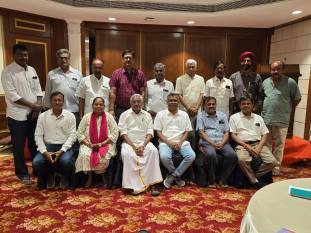NEW DELHI, 16 September 2024 : b>New Delhi, Sep 12, 2024: For an Atmanirbhar Bharat, it's crucial that our agriculture remains progressive, giving farmers the freedom to choose the practices and technologies that best suit their needs.
Farmers from ten states recently gathered in the National Capital under United Farmers Empowerment Initiative, urging Prime Minister Narendra Modi to intervene and help “make Indian farmers globally competitive, farming more remunerative, and agriculture a high-yielding profession.”
They also requested Prime Minister to ensure the Government of India “cleared the regulatory hurdles at the earliest” to ensure speedy rollout of the GM crops.
At a meeting held in the city, the progressive farmers made a strong case for the swift introduction of genetically modified (GM) crops and other advanced agricultural technologies. This unified appeal from farmers across India follows the split decision by the Supreme Court on GM Mustard, a case that has been stalled for over two decades. Farmers gave a clarion call for a science-based approach to agricultural policy. The farmers stressed that India's agricultural future hinges on the timely and responsible adoption of modern technologies like GM crops, which have the potential to boost productivity, reduce import dependence, and secure the livelihoods of millions.
The farmers highlighted that GM crops, including GM Mustard, have the potential to revolutionize Indian agriculture by boosting crop yields, reducing reliance on imports, and addressing challenges like climate change and pest resistance. They noted that these technologies have been safely used in many countries for decades, with no adverse effects on health or the environment.
"We are concerned that a game-changing technology like GM crops, which could transform the lives of Indian farmers, is being hindered and not introduced," V Ravichandran, a farmer belonging to Tamil Nadu said. “We expressed our support to the government for their 2022 genome editing guidelines, which brought efficiency to the breeding process, and are appreciative of the Supreme Court’s directive to formulate a National GM Policy with input from all stakeholders. However, we fear that delays in introducing these technologies are negatively impacting farmers and hindering their progress,” Ravichandran added.
Despite overwhelming scientific evidence supporting the safety and efficacy of GM crops, there remains significant opposition in India, often fueled by misinformation. The farmers challenged this opposition by sharing their personal experiences with GM crops like Bt Cotton, which has already demonstrated its ability to improve yields and boost farmer incomes.
Sudhanshu Kumar, a farmer from Bihar said, “India's reliance on oilseed imports has surged, rising from ₹1,56,800 crores in 2021-22 to ₹1,67,270 crores in 2022-23. The mustard yield curve has plateaued over the past two decades, with the national average hovering around 1.2 tons per hectare, far below the 2 tons per hectare required to meet future demand.” The farmers argued that introducing higher-yielding varieties of mustard could help close this gap, reduce reliance on costly imports, and increase farmers’ income.
According to the farmers, these technologies have been adopted globally for decades without any adverse effects on health or the environment. They urged the government to formulate a national policy rooted in scientific evidence to support the adoption of these innovations.
The farmers gathered under the banner of the United Farmers Empowerment Initiatives are staunch advocates for the use of progressive agricultural technologies, high-quality seeds, and judicious farming practices to enhance productivity. They have been pioneers in the successful use of Bt Cotton, which has significantly improved yields and farmer incomes across the country.
“We keep hearing false claims that Bt Cotton fails to address challenges posed by pests like pink bollworms and sucking pests. However, it's crucial to understand that Bt Cotton is engineered to target American bollworms specifically and isn't a universal solution for all pest-related issues. In fact, in India, 95% of cotton farmers have been successfully and happily using Bt cotton seeds for the past 22 years and we have only observed increased productivity,” said Ganesh Nanote, a Bt Cotton grower from Akola, Maharashtra. Nanote and many other farmers, refuted the recent claims questioning the effectiveness of Bt Cotton. Farmers called for the introduction of next-generation technology in cotton and other crops.
“There is a concerted effort to hinder the introduction of GM crops in India by spreading misinformation about GM Crops, including Bt Cotton, Bt Brinjal, and GM Mustard. On On the contrary, our experience with Bt Cotton has shown that it increased productivity and the scientific evidence for other GM crops do not suggest any such harm,” said Nanote. He farms Bt cotton on 12 to 15 acres of land.




















